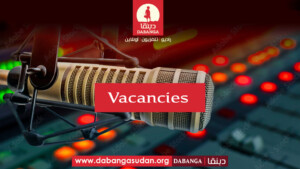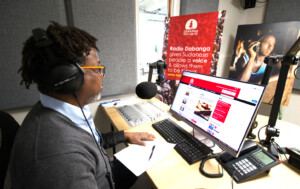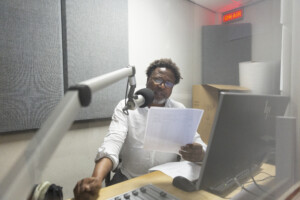Frequently Asked Questions
A Frequently Asked Questions page

Or keep on reading to find answers on questions about:
The international political situation has caused a winding down of the usual support that Radio Dabanga bases its operations on. This, coupled with our imminent independence from Free Press Unlimited, means that Radio Dabanga’s need for funding is greater than ever. We have set up this campaign to boost the financial foundations which will help us to take off into independence. Scroll down for the last question about how we see our future!
How much money are you raising?
At least €45.000, which will set us well on our way to Radio Dabanga’s tenth anniversary on the 2nd December.
Radio Dabanga needs €45.000 in order to stay in the air. Shortwave radio is very expensive to produce, but is the only option that we have as the Sudanese government has tried multiple times to block the broadcasting of Radio Dabanga. €45.000 will allow us to stay on air for the foreseeable future – with each daily one hour broadcast amounting to €290. Of course we would like to broadcast as long as possible, but €45.000 is an amount we believe we can ask from you for support until our anniversary.
How much impact will my money have?
€5 = one minute of airtime
€48 = ten minutes of airtime
€290 = one day of airtime (Radio Dabanga is broadcast for one hour per day)
€2.030 = one week of airtime
€8.700 = one month of airtime
€45.000 = 155 days of airtime (this will take us to Radio Dabanga’s 10th anniversary, for which we have big things planned!)
What happens when I donate?
When you donate on GoGetFunding, the money you give will be sent via Free Press Unlimited. Free Press Unlimited (FPU) is one of the initiators of Radio Dabanga and still supports the team in organizational and financial matters. Which is why the name of FPU may appear in the payment details of your donation. All money raised in this campaign will go to the shortwave broadcasts of Radio Dabanga.
How can I donate with iDeal?
We have set up a second donation system for you at the Dutch crowdfunding platform Geef.nl. Your donation here will be added to this campaign within two working days. All the money collected here will be added manually to the GoGetFunding page by means of an offline donation. If you have donated via Geef.nl and would like to receive a reward, please email us at [email protected].
What is the situation in Sudan?
“If it were a new crisis, the dimensions of it, the scale and the need of it, would be such that it would be one of the biggest crises in the world,” said Marta Ruedas, United Nations Resident and Humanitarian Coordinator in Sudan. Over the past 14 years, 3.3 million people have been displaced by armed conflicts in Sudan – on a total population of nearly 40 million people. The Sudanese army has been known to bomb civilians in its fight against the armed movements, and militias armed by the regime burn and plunder their way across villages and farms. More than 300,000 Sudanese people were killed in Darfur, one of Sudan’s conflict-ridden regions, according to the United Nations.
This year the United Nations Security Council said it remains concerned about the considerable challenges that remain, particularly the challenge of ensuring sustainable solutions for Darfur’s 2.7 million internally displaced people. Sudan has often blocked access to aid organizations attempting to reach civilians in areas that lack health services.
Newspaper journalists must constantly watch that they don’t cross the fine lines of censorship, so they self-censor. One journalist was recently detained for an article about the deterioration of electricity and water services in Red Sea state. Sudan fell to position 183 (out of 198 countries) on the 2017 press freedom monitor of Freedom House. Little wonder that the public are glad for the only reliable, independent alternative; Radio Dabanga.
Why is free information important?
Publishing information which is accurate, unbiased, and verified is important because it allows for the building of communities which understand each other and for the reporting of issues which must be made known. For example, if there is an outbreak of cholera it must be recorded and reported so that people know how to avoid infection.
But free information is more than this. It is an acknowledgement that people in Sudan have a right to be heard, whether they are from Darfur, the Nuba Mountains, or the capital Khartoum. Radio Dabanga gives the public a voice and that allows them to be heard. In this way, Radio Dabanga promotes peace in its country. People who mostly communicate parochially within their own tribal circle can hear on their favourite radio station how others live and think.
What is the importance of radio here?
“The press in Sudan has little interest in the rural areas, or are prevented from going there. We want everyone, wherever they are in Sudan, to know that their problems are being taken seriously. Moreover, in a country where the government fabricates much of the news, they know that we report news that has been verified. We want to continue doing this as long as necessary. Our big dream is to return to a democratic Sudan as an independent radio station to continue our work there. My team is ready for the next step. After almost ten years under the Free Press Unlimited umbrella, it is time for us to stretch our own wings and prepare for an independent future.” – Kamal, Editor in chief
Radio Dabanga was founded 2008 by a coalition of Sudanese journalists, a number of international NGOs and the movers behind the Dutch campaign ‘Tot Zover Darfur’, including Stichting Vluchteling, Pax for Peace and Stichting Doen. The editorial department was accommodated by Free Press Unlimited, and in the initial years, broadcasts were mainly complied for and about Darfur. The editors who compile Dabanga’s daily broadcast have been working in exile for many years. Their personal stories are often intense, but they are very proud of their work.
Why are you based in Amsterdam?
When being a journalist in Sudan, Kamal was “not allowed to talk about the conflict in Darfur. That made me very sad, but also defiant. I wanted to give people the information they needed. I then met two Dutch representatives from Free Press Unlimited, and an idea was born for an independent radio station for Darfur. This was far too dangerous in Sudan, so I came to the Netherlands in 2008 to begin as editor-in-chief of Radio Dabanga. We’ve now enjoyed Dutch hospitality for almost ten years, and that has allowed us to do our important work.”
What do you mean by ‘exile’?
To be in exile means that you are barred from your native country, typically for political or punitive reasons. Radio Dabanga is in exile because the Sudanese government would hinder our operations if we were based in Sudan.
How is the radio transmitted?
Short wave radio allows signals to be transmitted over vast distances to a geographical target area. It is thanks to this slightly antiquated technology that news bulletins compiled in Amsterdam can be heard all over Sudan, from Jebel Marra to the Nuba Mountains. The range of short wave is far greater than FM. For FM transmission, Radio Dabanga would have to build transmission masts and that is not feasible under the current regime.
How do you save lives? What kind of information is broadcast?
In the apparently hopeless situation in Sudan, Radio Dabanga is a ray of hope for millions of people. The radio station advises them where the fighting is, or where they might find a safe refuge or aid. Dabanga reunites refugee families who have lost each other in the confusion, offers essential health information, and has promoted dialogue between rival tribes. In short, as an independent source of information, Radio Dabanga is of vital importance to people in Sudan, especially now that the outside world seems to have forgotten the conflict in the country. While Radio Dabanga produces a variety of different programs for the Sudanese, every day begins with life-saving news for people in conflict zones. For example, news over attacks in Darfur’s Jebel Marra where civilians are caught in the crossfire between government troops and rebels.
Who are the people you reach?
Our audience ranges from farmers in rural areas who have just been driven from their land, to people living in camps in Darfur who need updates on cholera outbreaks, to people in cities (decision makers, activists, people on the side lines who want change). Mostly young people are active on social media; they want to stand up for their rights, a good education, a decent career, an end to corruption. Radio Dabanga makes all of these people feel a close bond with ‘their’ radio station; they share masses of experiences, photos and videos with the editors that are often about conflict situations, attacks, and human rights violations. We listen to all of these people and make them feel as though they have a voice.
How many people do you reach?
Radio Dabanga reaches 2.3 individual listeners per day (the population of Sudan is around 40 million) according to a listener survey conducted in 2009 in which researchers interviewed more than 1,500 people in cities, towns, and Darfur’s refugee camps. According to researchers, the Radio Dabanga signature jingle could be heard everywhere. The most popular radio station in the Netherlands, Radio 538, can boast 3.5 million listeners a week. According to the survey, Radio Dabanga was even more popular than BBC Africa News. This popularity far exceeded anything the editors in Amsterdam had dreamed of. To top this statistic, the 2009 survey and spot checks in Khartoum reported that Radio Dabanga reaches 6.5 million people per week via shortwave radio and satellite TV (more information below).
What other channels of information does Radio Dabanga use?
While Radio Dabanga only broadcast on short wave radio during the early years, the station now has several channels at its disposal. The editors have innovated and experimented in the sphere of new media, often at the request of their listeners. These include Satellite TV, Facebook, WhatsApp, and Soundcloud. But shortwave radio remains our biggest priority; almost half of all Sudanese people are illiterate, a number that is relatively higher in Sudan’s remote areas and camps for displaced people. Many people here have no lifeline to the outside world other than telephone and radio.
- Satellite TV: The TV channel was set up in 2013 due to fierce demand from Radio Dabanga’s urban audience. It airs slides of news items and photos in Arabic while playing the day's Sudanese Files and radio broadcasts in the background.
- Website: All news that has been reported on the radio is rewritten and published as articles on the Arabic and English websites. The website functions as an archive of all news bulletins and radio programs that have been aired. It also is the main platform to inform the international community about the situation in Sudan. The new mobile-friendly platform serves as a news source for Sudanese people, although internet penetration in the country is just above 27 percent.
- Facebook: One of Radio Dabanga’s biggest channels is its Facebook page. More than 200,000 followers go here to react on news and videos that Dabanga publishes here. Followers are also encouraged to discuss news subjects and participate in Facebook polls.
- WhatsApp: About 1,000 to 2,000 people send WhatsApp messages each day to Radio Dabanga. They inform Radio Dabanga of what is taking place in Sudan or send their photos and videos which are used to make user-generated news reports. The editors then publish the news of the day to multiple WhatsApp groups once it has been verified.
By following this link you will be able to discover more statistics about Radio Dabanga’s channels of communication.
What does dabanga mean?
It’s not for nothing that the station is named after the dabanga, a large earthenware pot in which all households store their valuables; jewelery, money, official papers, and food for lean times. Should this treasure, the news about their lives, no longer exist, a great radio silence will fall over Sudan. We cannot allow that to happen.
How is the international community involved?
Radio Dabanga was founded at a time when the international community was very concerned about the crisis in Darfur. Omar Al Bashir was indicted by the International Criminal Court and the United Nations sent an extensive peacekeeping mission. Sudan is receiving US trade missions, in exchange for help in the fight against the extremist violence of Islamist groups (such as Al Qaida) who once had their headquarters in Sudan. The European Union is keen to cooperate with Sudan to stem the tide of migration from Africa to Europe. That does not bode well for refugees and migrants. In fact, the Janjaweed, who have been integrated into the Sudanese army in the guise of the Rapid Support Forces and Border Guards, will hold-back migrants on behalf of the European Union. Reports of refugees being flogged with whips have not affected the attitude of the EU, in spite of concerned questions by EU Parliamentarians. Sudan’s international position puts it on a fast track from pariah to ‘friendly nation’. In this context of ‘flexible’ views on human rights, Radio Dabanga is needed more than ever.
How does Radio Dabanga see the future?
Radio Dabanga has set itself two major goals for the immediate future. We strive to to inform even more Sudanese people of independent, life-saving news, and to become financially independent from the operational support of the Dutch NGO Free Press Unlimited. Radio Dabanga has the qualities on board to grow into an independent radio station. There are ample opportunities to extend penetration into Sudan, but the major challenge is to first lay down a sound financial base for ourselves. Only once we have this can Radio Dabanga make a serious effort towards putting Sudan back on the international map.
The Dabanga team is brim-full of ideas to give the station greater range and more impact. A project officer keeps abreast of relevant innovations via conferences, documentation, and hackathons. Radio Dabanga is keen to meet the requests of many listeners, such as a separate youth programme, a women’s programme, and a greater role platform for peace and reconciliation. The editorial team themselves would like to develop a chatbot to assist the social media editor to filter the thousands of WhatsApp messages for the most crucial information – for a quicker response to listeners’ questions.
Please contact us at [email protected]. We will try to get back to you as soon as possible.
Note: Our campaign on GoGetFunding.com has come to an end. You can still donate to Radio Dabanga through the Dutch Geef.nl platform!












 and then
and then